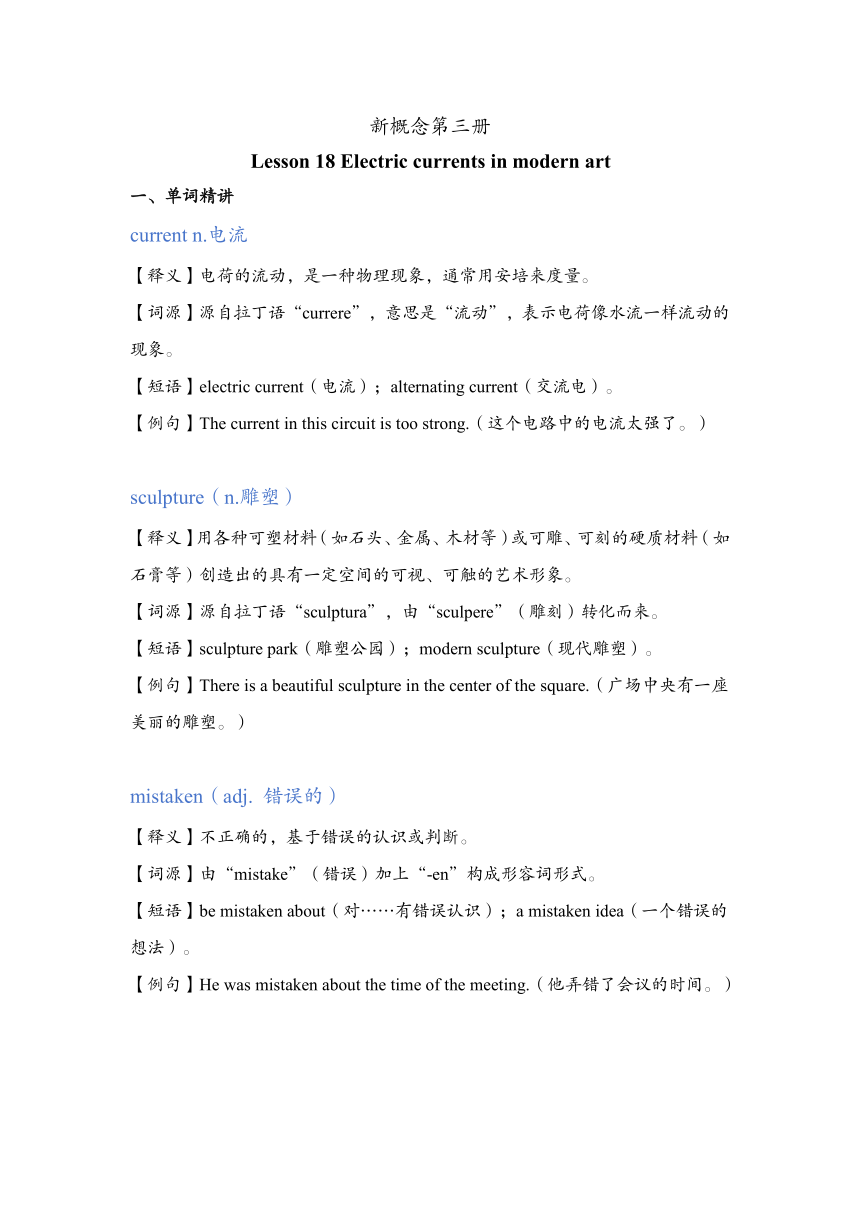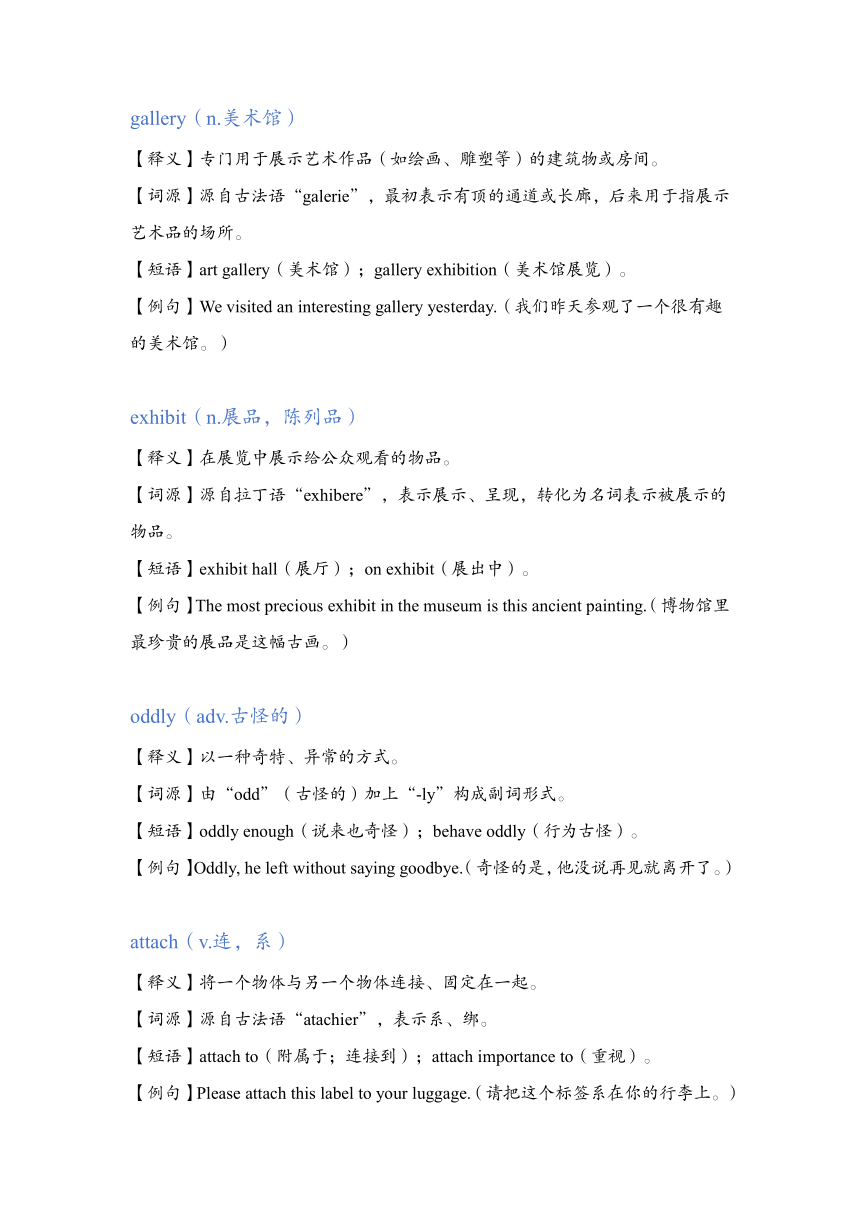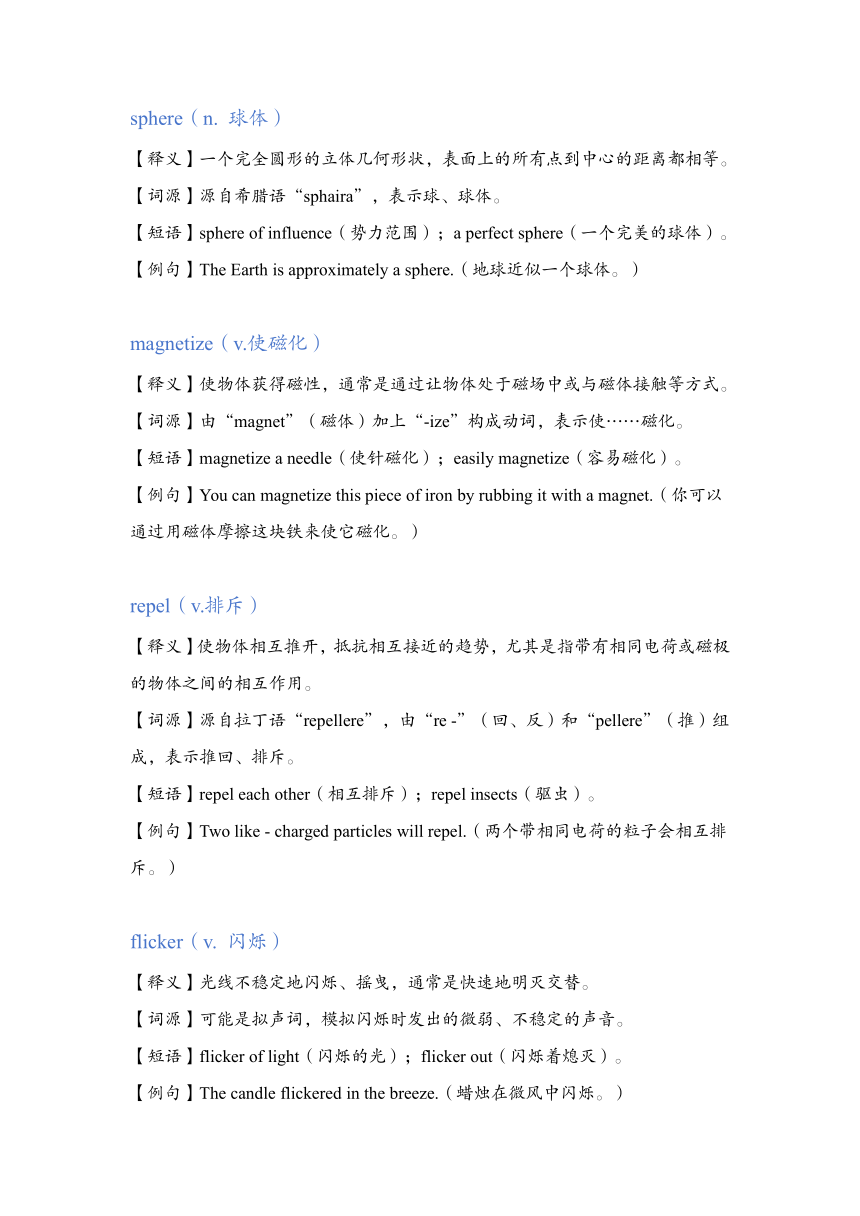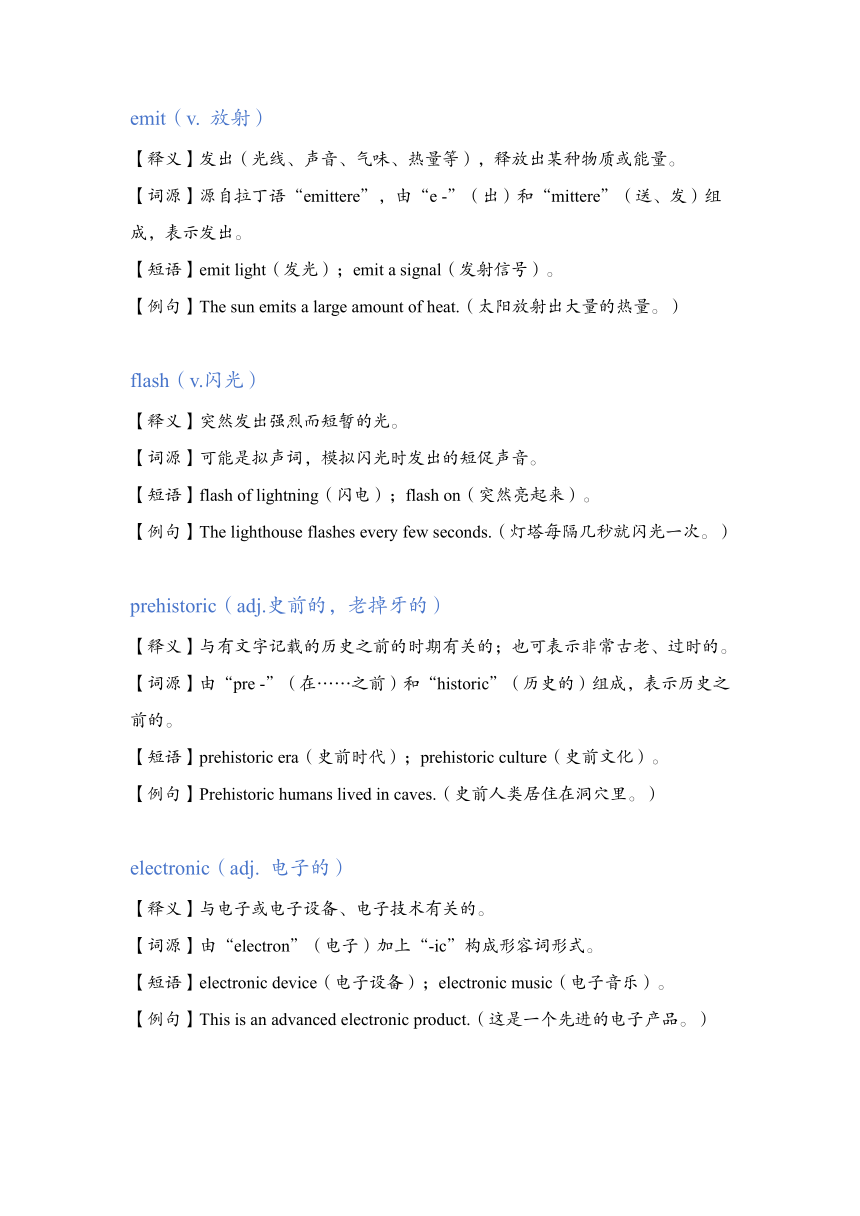新概念第三册 Lesson 18 Electric currents in modern art 讲义
文档属性
| 名称 | 新概念第三册 Lesson 18 Electric currents in modern art 讲义 |  | |
| 格式 | docx | ||
| 文件大小 | 255.4KB | ||
| 资源类型 | 教案 | ||
| 版本资源 | 新概念英语 | ||
| 科目 | 英语 | ||
| 更新时间 | 2024-12-04 16:32:49 | ||
图片预览




文档简介
新概念第三册
Lesson 18 Electric currents in modern art
单词精讲
current n.电流
【释义】电荷的流动,是一种物理现象,通常用安培来度量。
【词源】源自拉丁语“currere”,意思是“流动”,表示电荷像水流一样流动的现象。
【短语】electric current(电流);alternating current(交流电)。
【例句】The current in this circuit is too strong.(这个电路中的电流太强了。)
sculpture(n.雕塑)
【释义】用各种可塑材料(如石头、金属、木材等)或可雕、可刻的硬质材料(如石膏等)创造出的具有一定空间的可视、可触的艺术形象。
【词源】源自拉丁语“sculptura”,由“sculpere”(雕刻)转化而来。
【短语】sculpture park(雕塑公园);modern sculpture(现代雕塑)。
【例句】There is a beautiful sculpture in the center of the square.(广场中央有一座美丽的雕塑。)
mistaken(adj. 错误的)
【释义】不正确的,基于错误的认识或判断。
【词源】由“mistake”(错误)加上“-en”构成形容词形式。
【短语】be mistaken about(对……有错误认识);a mistaken idea(一个错误的想法)。
【例句】He was mistaken about the time of the meeting.(他弄错了会议的时间。)
gallery(n.美术馆)
【释义】专门用于展示艺术作品(如绘画、雕塑等)的建筑物或房间。
【词源】源自古法语“galerie”,最初表示有顶的通道或长廊,后来用于指展示艺术品的场所。
【短语】art gallery(美术馆);gallery exhibition(美术馆展览)。
【例句】We visited an interesting gallery yesterday.(我们昨天参观了一个很有趣的美术馆。)
exhibit(n.展品,陈列品)
【释义】在展览中展示给公众观看的物品。
【词源】源自拉丁语“exhibere”,表示展示、呈现,转化为名词表示被展示的物品。
【短语】exhibit hall(展厅);on exhibit(展出中)。
【例句】The most precious exhibit in the museum is this ancient painting.(博物馆里最珍贵的展品是这幅古画。)
oddly(adv.古怪的)
【释义】以一种奇特、异常的方式。
【词源】由“odd”(古怪的)加上“-ly”构成副词形式。
【短语】oddly enough(说来也奇怪);behave oddly(行为古怪)。
【例句】Oddly, he left without saying goodbye.(奇怪的是,他没说再见就离开了。)
attach(v.连,系)
【释义】将一个物体与另一个物体连接、固定在一起。
【词源】源自古法语“atachier”,表示系、绑。
【短语】attach to(附属于;连接到);attach importance to(重视)。
【例句】Please attach this label to your luggage.(请把这个标签系在你的行李上。)
sphere(n. 球体)
【释义】一个完全圆形的立体几何形状,表面上的所有点到中心的距离都相等。
【词源】源自希腊语“sphaira”,表示球、球体。
【短语】sphere of influence(势力范围);a perfect sphere(一个完美的球体)。
【例句】The Earth is approximately a sphere.(地球近似一个球体。)
magnetize(v.使磁化)
【释义】使物体获得磁性,通常是通过让物体处于磁场中或与磁体接触等方式。
【词源】由“magnet”(磁体)加上“-ize”构成动词,表示使……磁化。
【短语】magnetize a needle(使针磁化);easily magnetize(容易磁化)。
【例句】You can magnetize this piece of iron by rubbing it with a magnet.(你可以通过用磁体摩擦这块铁来使它磁化。)
repel(v.排斥)
【释义】使物体相互推开,抵抗相互接近的趋势,尤其是指带有相同电荷或磁极的物体之间的相互作用。
【词源】源自拉丁语“repellere”,由“re -”(回、反)和“pellere”(推)组成,表示推回、排斥。
【短语】repel each other(相互排斥);repel insects(驱虫)。
【例句】Two like - charged particles will repel.(两个带相同电荷的粒子会相互排斥。)
flicker(v. 闪烁)
【释义】光线不稳定地闪烁、摇曳,通常是快速地明灭交替。
【词源】可能是拟声词,模拟闪烁时发出的微弱、不稳定的声音。
【短语】flicker of light(闪烁的光);flicker out(闪烁着熄灭)。
【例句】The candle flickered in the breeze.(蜡烛在微风中闪烁。)
emit(v. 放射)
【释义】发出(光线、声音、气味、热量等),释放出某种物质或能量。
【词源】源自拉丁语“emittere”,由“e -”(出)和“mittere”(送、发)组成,表示发出。
【短语】emit light(发光);emit a signal(发射信号)。
【例句】The sun emits a large amount of heat.(太阳放射出大量的热量。)
flash(v.闪光)
【释义】突然发出强烈而短暂的光。
【词源】可能是拟声词,模拟闪光时发出的短促声音。
【短语】flash of lightning(闪电);flash on(突然亮起来)。
【例句】The lighthouse flashes every few seconds.(灯塔每隔几秒就闪光一次。)
prehistoric(adj.史前的,老掉牙的)
【释义】与有文字记载的历史之前的时期有关的;也可表示非常古老、过时的。
【词源】由“pre -”(在……之前)和“historic”(历史的)组成,表示历史之前的。
【短语】prehistoric era(史前时代);prehistoric culture(史前文化)。
【例句】Prehistoric humans lived in caves.(史前人类居住在洞穴里。)
electronic(adj. 电子的)
【释义】与电子或电子设备、电子技术有关的。
【词源】由“electron”(电子)加上“-ic”构成形容词形式。
【短语】electronic device(电子设备);electronic music(电子音乐)。
【例句】This is an advanced electronic product.(这是一个先进的电子产品。)
peculiar(adj. 奇异的)
【释义】与众不同的、独特的、奇怪的。
【词源】源自拉丁语“peculiaris”,最初表示个人的、私人的,后来引申为独特的、奇异的。
【短语】peculiar smell(奇特的气味);peculiar behavior(怪异的行为)。
【例句】He has a peculiar way of walking.(他有一种奇特的走路方式。)
shock(v.令人震惊,刺激人)
【释义】使某人感到惊讶、不安或受到强烈的情感冲击。
【词源】源自古法语“choc”,表示冲击、碰撞,引申为令人震惊。
【短语】shock sb. into doing sth.(使某人震惊而做某事);be shocked at(对……感到震惊)。
【例句】The news shocked everyone in the room.(这个消息令房间里的每个人都感到震惊。)
emotionally(adv.感情上)
【释义】与情感或情绪有关地;在情感方面。
【词源】由“emotional”(情感的)加上“-ly”构成副词形式。
【短语】emotionally stable(情绪稳定的);emotionally affected(在感情上受到影响)。
【例句】He is very sensitive emotionally.(他在感情上非常敏感。)
二、课文精讲
1.The idea that modern art can only be seen in museums is mistaken.那种认为现代艺术只能在博物馆里才能看到的观点是错误的。此处that引导的从句作idea的同位语。修饰限定the idea 的内容Eg.: The idea that one can learn English well in Englis-speaking countries is mistaken.重点句式结构
2.Even people who take no interest in art cannot have failed to notice examples of modern sculpture on display in public places.即使是对艺术不感兴趣的人也不会不注意到在公共场所展示的现代艺术品。take no interest in…,作“对……不感兴趣”解。take interest in 对……感兴趣;take delight in 对……感到高兴
take pride in 对……感到骄傲
show interest in 显示对……的兴趣cannot have failed to notice, 不至于没注意到。cannot;failed to 双重否定意味着肯定
He must have passed his examination last week.You must keep your promise.You can't fail to keep your promise.He cannot have failed to pass his examination last week.“cannot+have+过去分词”表示对于过去的事所作的不肯定的推测。on display/on show 展览,展出
3. Oddly shaped forms that are suspended from the ceiling and move in response to a gust of wind are quite familiar to everybody.人们所熟悉的是悬挂在天花板上、造型奇特、随风飘荡的雕塑品。move in response to a gust of wind,随风飘荡。in response(to)作“回答’、“响应”、“作出反应”讲。此处是“(展品)随风而动”的意思。be familiar to…是“为……所熟悉”的意思。are ... familiar to ...谓语句子主干:Oddly shaped forms are familiar to everybody
that 定语从句中:in response to/in reaction to 作为对……的反应
be familiar to sb.对某人来讲很熟悉
Eg.: The house is familiar to him.
Eg.: I don't really remember where I have seen him before,but he looks very familiar to me.familiar with 熟悉,熟知
Are you familiar with the play of Shakespeare
I'm familiar with that book too.be familiar to sb./be familiar with sth.
4. These objects, however, were different. Lined up against the wall, there were long thin wires attached to metal spheres.这些展品却使人大开眼界。靠墙排列着许多细长的电线,而电线又连着金属球。
Lined up against the wall, 靠墙排列着。
lined up 过去分词做状语,与long with wires 为被动关系
attached to metal spheres 过去分词做定语,修饰long thin wires
定语从句
there were long thin wires that were attached to metal sphers.
5. In spite of this, some people -- including myself -- were surprised by a recent exhibition of modern sculpture.尽管如此,最近举办的一次现代雕塑展览还是使一些人(包括我在内)大吃了一惊。 in spite of this 尽管如此
6. In the centre of the hall, there were a number of tall structures which contained coloured lights.展厅中央是装有彩色灯泡的许多高高的构件,灯泡一刻不停地闪烁着,就像失去了控制的红绿灯。 the center of the hall 展厅的中央coloured lights 彩色灯泡
7. These lights flickered continuously like traffic lights which have gone mad.小黑盒子里迸出火花,
like traffic lights which have gone mad, 就像失去控制的红绿灯一样。
go mad 发疯,发狂:run mad
He must have gone mad to do such a thing.
continuously adv. 不停止的
8. Sparks were emitted from small black boxes and red lamps flashed on and off angrily.红色灯泡发怒似地忽明忽暗。 on and off(亦作 off and on)作“断断续续地”、“有时”讲。 on and off: continuously
9. These peculiar forms not only seemed designed to shock people emotionally,好像设计这些奇形怪状的展品不仅是为了给人感情上的强烈刺激, 其中seemed是系动词,seemed designed 作用与were designed是一样的。 rarely: seldom
Lesson 18 Electric currents in modern art
单词精讲
current n.电流
【释义】电荷的流动,是一种物理现象,通常用安培来度量。
【词源】源自拉丁语“currere”,意思是“流动”,表示电荷像水流一样流动的现象。
【短语】electric current(电流);alternating current(交流电)。
【例句】The current in this circuit is too strong.(这个电路中的电流太强了。)
sculpture(n.雕塑)
【释义】用各种可塑材料(如石头、金属、木材等)或可雕、可刻的硬质材料(如石膏等)创造出的具有一定空间的可视、可触的艺术形象。
【词源】源自拉丁语“sculptura”,由“sculpere”(雕刻)转化而来。
【短语】sculpture park(雕塑公园);modern sculpture(现代雕塑)。
【例句】There is a beautiful sculpture in the center of the square.(广场中央有一座美丽的雕塑。)
mistaken(adj. 错误的)
【释义】不正确的,基于错误的认识或判断。
【词源】由“mistake”(错误)加上“-en”构成形容词形式。
【短语】be mistaken about(对……有错误认识);a mistaken idea(一个错误的想法)。
【例句】He was mistaken about the time of the meeting.(他弄错了会议的时间。)
gallery(n.美术馆)
【释义】专门用于展示艺术作品(如绘画、雕塑等)的建筑物或房间。
【词源】源自古法语“galerie”,最初表示有顶的通道或长廊,后来用于指展示艺术品的场所。
【短语】art gallery(美术馆);gallery exhibition(美术馆展览)。
【例句】We visited an interesting gallery yesterday.(我们昨天参观了一个很有趣的美术馆。)
exhibit(n.展品,陈列品)
【释义】在展览中展示给公众观看的物品。
【词源】源自拉丁语“exhibere”,表示展示、呈现,转化为名词表示被展示的物品。
【短语】exhibit hall(展厅);on exhibit(展出中)。
【例句】The most precious exhibit in the museum is this ancient painting.(博物馆里最珍贵的展品是这幅古画。)
oddly(adv.古怪的)
【释义】以一种奇特、异常的方式。
【词源】由“odd”(古怪的)加上“-ly”构成副词形式。
【短语】oddly enough(说来也奇怪);behave oddly(行为古怪)。
【例句】Oddly, he left without saying goodbye.(奇怪的是,他没说再见就离开了。)
attach(v.连,系)
【释义】将一个物体与另一个物体连接、固定在一起。
【词源】源自古法语“atachier”,表示系、绑。
【短语】attach to(附属于;连接到);attach importance to(重视)。
【例句】Please attach this label to your luggage.(请把这个标签系在你的行李上。)
sphere(n. 球体)
【释义】一个完全圆形的立体几何形状,表面上的所有点到中心的距离都相等。
【词源】源自希腊语“sphaira”,表示球、球体。
【短语】sphere of influence(势力范围);a perfect sphere(一个完美的球体)。
【例句】The Earth is approximately a sphere.(地球近似一个球体。)
magnetize(v.使磁化)
【释义】使物体获得磁性,通常是通过让物体处于磁场中或与磁体接触等方式。
【词源】由“magnet”(磁体)加上“-ize”构成动词,表示使……磁化。
【短语】magnetize a needle(使针磁化);easily magnetize(容易磁化)。
【例句】You can magnetize this piece of iron by rubbing it with a magnet.(你可以通过用磁体摩擦这块铁来使它磁化。)
repel(v.排斥)
【释义】使物体相互推开,抵抗相互接近的趋势,尤其是指带有相同电荷或磁极的物体之间的相互作用。
【词源】源自拉丁语“repellere”,由“re -”(回、反)和“pellere”(推)组成,表示推回、排斥。
【短语】repel each other(相互排斥);repel insects(驱虫)。
【例句】Two like - charged particles will repel.(两个带相同电荷的粒子会相互排斥。)
flicker(v. 闪烁)
【释义】光线不稳定地闪烁、摇曳,通常是快速地明灭交替。
【词源】可能是拟声词,模拟闪烁时发出的微弱、不稳定的声音。
【短语】flicker of light(闪烁的光);flicker out(闪烁着熄灭)。
【例句】The candle flickered in the breeze.(蜡烛在微风中闪烁。)
emit(v. 放射)
【释义】发出(光线、声音、气味、热量等),释放出某种物质或能量。
【词源】源自拉丁语“emittere”,由“e -”(出)和“mittere”(送、发)组成,表示发出。
【短语】emit light(发光);emit a signal(发射信号)。
【例句】The sun emits a large amount of heat.(太阳放射出大量的热量。)
flash(v.闪光)
【释义】突然发出强烈而短暂的光。
【词源】可能是拟声词,模拟闪光时发出的短促声音。
【短语】flash of lightning(闪电);flash on(突然亮起来)。
【例句】The lighthouse flashes every few seconds.(灯塔每隔几秒就闪光一次。)
prehistoric(adj.史前的,老掉牙的)
【释义】与有文字记载的历史之前的时期有关的;也可表示非常古老、过时的。
【词源】由“pre -”(在……之前)和“historic”(历史的)组成,表示历史之前的。
【短语】prehistoric era(史前时代);prehistoric culture(史前文化)。
【例句】Prehistoric humans lived in caves.(史前人类居住在洞穴里。)
electronic(adj. 电子的)
【释义】与电子或电子设备、电子技术有关的。
【词源】由“electron”(电子)加上“-ic”构成形容词形式。
【短语】electronic device(电子设备);electronic music(电子音乐)。
【例句】This is an advanced electronic product.(这是一个先进的电子产品。)
peculiar(adj. 奇异的)
【释义】与众不同的、独特的、奇怪的。
【词源】源自拉丁语“peculiaris”,最初表示个人的、私人的,后来引申为独特的、奇异的。
【短语】peculiar smell(奇特的气味);peculiar behavior(怪异的行为)。
【例句】He has a peculiar way of walking.(他有一种奇特的走路方式。)
shock(v.令人震惊,刺激人)
【释义】使某人感到惊讶、不安或受到强烈的情感冲击。
【词源】源自古法语“choc”,表示冲击、碰撞,引申为令人震惊。
【短语】shock sb. into doing sth.(使某人震惊而做某事);be shocked at(对……感到震惊)。
【例句】The news shocked everyone in the room.(这个消息令房间里的每个人都感到震惊。)
emotionally(adv.感情上)
【释义】与情感或情绪有关地;在情感方面。
【词源】由“emotional”(情感的)加上“-ly”构成副词形式。
【短语】emotionally stable(情绪稳定的);emotionally affected(在感情上受到影响)。
【例句】He is very sensitive emotionally.(他在感情上非常敏感。)
二、课文精讲
1.The idea that modern art can only be seen in museums is mistaken.那种认为现代艺术只能在博物馆里才能看到的观点是错误的。此处that引导的从句作idea的同位语。修饰限定the idea 的内容Eg.: The idea that one can learn English well in Englis-speaking countries is mistaken.重点句式结构
2.Even people who take no interest in art cannot have failed to notice examples of modern sculpture on display in public places.即使是对艺术不感兴趣的人也不会不注意到在公共场所展示的现代艺术品。take no interest in…,作“对……不感兴趣”解。take interest in 对……感兴趣;take delight in 对……感到高兴
take pride in 对……感到骄傲
show interest in 显示对……的兴趣cannot have failed to notice, 不至于没注意到。cannot;failed to 双重否定意味着肯定
He must have passed his examination last week.You must keep your promise.You can't fail to keep your promise.He cannot have failed to pass his examination last week.“cannot+have+过去分词”表示对于过去的事所作的不肯定的推测。on display/on show 展览,展出
3. Oddly shaped forms that are suspended from the ceiling and move in response to a gust of wind are quite familiar to everybody.人们所熟悉的是悬挂在天花板上、造型奇特、随风飘荡的雕塑品。move in response to a gust of wind,随风飘荡。in response(to)作“回答’、“响应”、“作出反应”讲。此处是“(展品)随风而动”的意思。be familiar to…是“为……所熟悉”的意思。are ... familiar to ...谓语句子主干:Oddly shaped forms are familiar to everybody
that 定语从句中:in response to/in reaction to 作为对……的反应
be familiar to sb.对某人来讲很熟悉
Eg.: The house is familiar to him.
Eg.: I don't really remember where I have seen him before,but he looks very familiar to me.familiar with 熟悉,熟知
Are you familiar with the play of Shakespeare
I'm familiar with that book too.be familiar to sb./be familiar with sth.
4. These objects, however, were different. Lined up against the wall, there were long thin wires attached to metal spheres.这些展品却使人大开眼界。靠墙排列着许多细长的电线,而电线又连着金属球。
Lined up against the wall, 靠墙排列着。
lined up 过去分词做状语,与long with wires 为被动关系
attached to metal spheres 过去分词做定语,修饰long thin wires
定语从句
there were long thin wires that were attached to metal sphers.
5. In spite of this, some people -- including myself -- were surprised by a recent exhibition of modern sculpture.尽管如此,最近举办的一次现代雕塑展览还是使一些人(包括我在内)大吃了一惊。 in spite of this 尽管如此
6. In the centre of the hall, there were a number of tall structures which contained coloured lights.展厅中央是装有彩色灯泡的许多高高的构件,灯泡一刻不停地闪烁着,就像失去了控制的红绿灯。 the center of the hall 展厅的中央coloured lights 彩色灯泡
7. These lights flickered continuously like traffic lights which have gone mad.小黑盒子里迸出火花,
like traffic lights which have gone mad, 就像失去控制的红绿灯一样。
go mad 发疯,发狂:run mad
He must have gone mad to do such a thing.
continuously adv. 不停止的
8. Sparks were emitted from small black boxes and red lamps flashed on and off angrily.红色灯泡发怒似地忽明忽暗。 on and off(亦作 off and on)作“断断续续地”、“有时”讲。 on and off: continuously
9. These peculiar forms not only seemed designed to shock people emotionally,好像设计这些奇形怪状的展品不仅是为了给人感情上的强烈刺激, 其中seemed是系动词,seemed designed 作用与were designed是一样的。 rarely: seldom
同课章节目录
